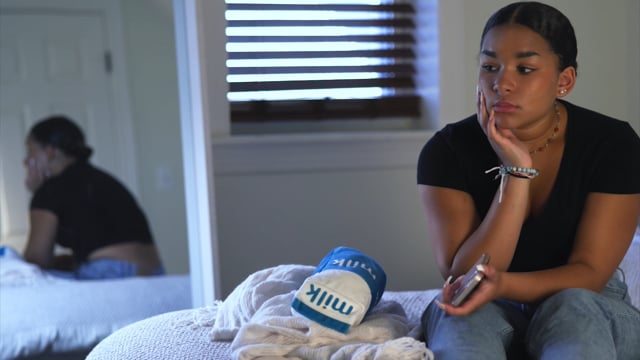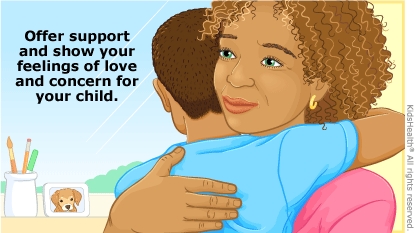It’s normal for kids to feel sad, act grouchy, or be in a bad mood at times. But when a sad or bad mood lasts for weeks or longer, and when there are other changes in a child’s behavior, it might be depression.
Therapy can help children who are going through sadness or depression. And there are things parents can do, too. Getting the right care can prevent things from getting worse and help a child feel better.
If sadness has lasted for weeks or longer, talk about it with your child’s doctor.
How Can I Tell if My Child Is Depressed?
If a child is depressed, parents may notice some of these signs:
- Sad or bad mood. A child may seem sad, lonely, unhappy, or grouchy. It can last weeks or months. A child may cry more easily. They may have more tantrums than before.
- Being self-critical. Kids going through depression may complain a lot. They may say self-critical things like, “I can’t do anything right.” “I don’t have any friends.” “I can’t do this.” “It’s too hard for me.”
- Lack of energy and effort. Depression can drain a child’s energy. They might put less effort into school than before. Even doing little tasks can feel like too much effort. Kids may seem tired, give up easily, or not try.
- Not enjoying things. Kids don’t have as much fun with friends or enjoy playing like before. They may not feel like doing things they used to enjoy.
- Sleep and eating changes. Kids may not sleep well or seem tired even if they get enough sleep. Some may not feel like eating. Others may overeat.
- Aches and pains. Some children may have stomach aches or other pains. Some miss school days because of not feeling well, even though they aren’t sick.
What Causes Child Depression?
Different things can lead to depression. There is no single cause. Some children have genes that make them more sensitive to depression. They may have other family members who have been depressed.
Some children go through stressful things. Some have faced loss, trauma, or hardships. Some go through serious health conditions. These things can lead to sadness or grief — and sometimes to depression.
Having extra support during and after hard times helps protect children from depression or lessen the effects. But even when they have good support, some children get depressed. Therapy can help them heal, feel better, and get back to enjoying things.
-

Is Your Child Depressed?
How can parents know what’s typical moodiness and when there is a problem? Learn the signs of depression and ways to help your child feel better.
What Is the Therapy for Child Depression?
The therapy for child depression is cognitive behavioral therapy (CBT). Therapists help kids feel welcome and supported. They have kids talk about what they think and feel. They may use stories, play, lessons, or workbooks. These tools can help children feel at ease and get the most from CBT. When possible, a child’s therapy includes their parent.
If a child has gone through a loss, trauma, or other difficult events, the therapy will include things that help a child heal from that, too. And if a parent is dealing with their own loss or depression, the child’s therapist can help them get the care and support they need.
What Should I Do if I Think My Child Is Depressed?
If you think your child is depressed:
Talk with your child about sadness and depression. Kids might not know why they are so sad and why things seem so hard. Let them know you see that they’re going through a hard time and that you’re there to help. Listen, comfort, offer your support, and show love.
Set up a visit with your child’s doctor. Let your child’s doctor know if sad or bad moods seem to go on for a few weeks. By itself, this doesn’t always mean a child is depressed. Tell your child’s doctor if you have also noticed changes in your child’s sleep, eating, energy, or effort. Tell them if your child is dealing with a loss, a big stress, or hardship.
The doctor will do a physical exam. A full exam lets the doctor check for health issues that could cause your child’s symptoms. They can also check for depression. Your child’s doctor may refer you to a child therapist. The doctor’s office might have a child therapist on staff.
Set up a visit with a child therapist. A child therapist (mental health doctor) will spend time talking with you and your child. They will do an in-depth check for depression by asking questions and listening. The therapist can explain how therapy can help your child.
Take your child to therapy visits. The therapist may suggest a few visits, or more. Therapy can take time, but you will see progress along the way.
Be patient and kind. When your child acts moody or difficult, try to stay patient. Talk with your child’s therapist about the best ways to respond when your child acts this way. Often, it helps to connect with your child in a calm way, then guide them to better behavior. Instead of feeling bad, this lets kids feel proud of doing better. It lets them see that you’re proud of them, too.
Enjoy time together. Spend time with your child doing things you both can enjoy. Go for a walk, play a game, cook, read stories, make a craft, watch a funny movie. Spend time outdoors if you can. These things gently encourage positive moods. They help you and your child feel close.

